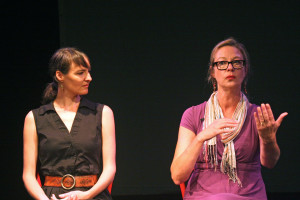By: Katie Auwaerter | Features Editor

The inaugural Pittsburgh Comedy Festival occurred Aug. 21-23, bringing together the art of stand-up and improv for workshops, panel discussions and performances. But comedians put the laughs aside on Saturday to look at the art form as a tool to see a different perspective off of the stage.
Improvisational theater, commonly known as improv, is a type of theater where the dialogue and actions of the performers are not scripted or pre-planned. Instead, the story and characters are developed as the audience is watching the performers in present time.
Though improvisational theater has been made popular thanks to shows like Whose Line Is It Anyway? and Steve Carell’s Riot, “honestly, Improv isn’t always funny. It’s just truthful. And the wisdom is in knowing the difference,” speaker Brenda Harger said.
Harger teaches improvisational acting and leads interdisciplinary groups at Carnegie Mellon’s Entertainment Center. More recently, she has been focusing on integrating improvisation into technology and gaming, creating believable characters and more interactive experiences.
Before improv can begin, Harger explains that those involved must first accept rules such as ‘you need to serve the narrative’ or ‘make your partner look good’ before stepping on stage “because it’s the rules that bring everybody to a safe place so that you can create together and so that you can take risks and not worry about what you look like…it’s becoming comfortable enough with what you don’t know that you can brush off and move on.”
When considering improvisational theater as a tool to elicit social change, speaker Hannah du Plessis focuses on the type of social change where the group is committed to improving their future.
“When I work with people, I don’t introduce improv,” du Plessis said. “But I introduce some of the philosophical principles of improv, of being open, of really listening to people, of trusting the process. So philosophically that informs how people work together.”
Originally an interior designer, du Plessis now helps companies such as Comcast and Microsoft take their design and strategy and connect it to their customers’ lives.
Skeptics of this method may believe that when faced with a problem, it would be easier to ‘talk it out.” But du Plessis explains that we are unaware of and can’t speak to the aspects that hinder social improvement because they are deeply engrained in us.
“We’re not aware of our own habitual ways of using power or trying to subvert power,” du Plessis said. “So those things can only become clear in role play, because when you role play, you need to become that, and when you become that, you actually have in that moment you have access to those blind spots and you can pull them out.”
Through the recreation of a situation by acting it out, not only does it expose deeply engrained facets of one’s personality, but it also shows how these personality traits affect the situation as a whole. While trying to discuss the situation may seem like a good solution to a problem, it may not produce its intended result.
“When you recreate the setting as one does in improv where you recreate those power structures, you create very immediate access points to shift them,” du Plessis said. Just saying ‘you’re wrong’ alienates. But putting him in a situation where he can understand his role in the dynamic educates and creates the opportunity for transformation.”
When developing the festival, Brian Gray, Executive Director of the Pittsburgh Comedy Festival, approached both Harger and du Plessis to show the importance of improv both on and off the stage.
“Improv is really something bigger than just making up funny stuff on stage,” Gray explained. “It can have a bigger impact, it can really transform the way people think and live in their daily life and I thought both of their stories were a great way of helping tell that narrative.”
If you haven’t noticed the news lately, the world is full of conflict. Whether it’s tensions between foreign nations, stalemate in a bipartisan government or a community divided by the death of a young man at the hands of a police officer, improvisational theater could be considered to aid the situation.
But du Plessis believes that improv may not be the first step to diffusing a tense situation. While she feels that simple discussion may not always lead to social change, “sometimes you actually need to have restorative conversations about reconciliation and forgiveness and places for people to absolve their trauma and not just jump into creating something that’s new and fun, but really acknowledge and work the past pains.”
Improv can’t change the world overnight. After all, there’s probably not a stage big enough to fit entire nations of people to role-play different tough circumstances. But that doesn’t mean improv doesn’t have the power to improve.
Harger states that “it’s about changing attitudes at the very beginning…I think what improv can do is take a few people at a time and get them to see a different point of view.”

